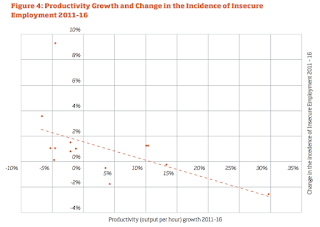A
strong
investigation by the Guardian’s Severin Carrell today shows the Scottish
Government is bringing in extra private sector funding and control to its
multibillion pound infrastructure programme.
The aim is to keep key projects off balance sheet to ensure
the Scottish Government meets European statistics agency Eurostat rules on
measuring state spending.
Companies set up to deliver hospital, roads and other
projects are being restructured, with greater private sector control and
funding.
This is bad news for taxpayers and for accountability.
Conventional funding with full democratic control and proper financial
transparency is the best way to finance schools, hospitals and other
infrastructure.
The changes have caused delays to contracts being signed off
and are a major setback for the so-called Non Profit Distributing model and hub
programme, which the Scottish Government tried to claim heralded the end of
disastrously expensive Public Private Partnership/Private Finance Initiative
schemes.
UNISON Scotland said such claims misrepresented the
continuing widespread use of private finance in public infrastructure.
We have highlighted for years the ways in which the Scottish
Futures Trust and the NPD model and hub, which it promotes, merely
continued
PPP/PFI with some ‘slight financial tweaking’ – PFI lite.
However, the structures it helped set up seem to have fallen
foul of the European System of Accounts 10 (ESA 10), applied in September 2014,
despite seeking external financial advice
five
times since 2010 to ensure the correct classification for NPD/hub projects.
Interestingly, the increased dependence on private sector
borrowing, as pointed out in the Guardian: “allows Holyrood to load up its
balance sheet with more debt”, making it “far easier for Nicola Sturgeon’s
government to borrow at least £2billion to fund further capital project and
bolster its anti-austerity stance using new powers from the Scotland Act 2012.”
Finance Secretary John Swinney said in Parliament on June 18
that ESA 10 “is designed to provide a comparable estimate of the level of debt
that is carried country by country across the European Union so that the levels
of debt can be assessed on a comparable basis.
“Frankly, those definitions are constantly changing and are
also then the subject of reinterpretation. The issues broadly relate to the
governance of projects and whether they are controlled by the public sector or
the private sector, and the acceptability of the approach to profit capping
that is implicit in the NPD programme.”
He said in a letter to the Finance Committee on 1 June that
the SFT has developed proposals for changes to contractual and shareholder
arrangements for hub projects “which further strengthen the case for a private
sector classification” and he has instructed the changes to be implemented
across the hub programme, which should take 6-8 weeks.
The Guardian report says that a leaked SFT document shows
that “for Hub projects affected by the changes, a 20% stake previously held in
each by public-sector partners will be transferred to a new private-sector
charity. That will give the private contractors the right to increase their
shares in the new companies set up to deliver each project from 60% to 80%.”
The document says that “any perception of public sector
control over the (project) delivery company must be avoided.”
Labour’s finance spokeswoman Jackie Baillie has tabled a
series
of questions in the Scottish Parliament, scheduled to be answered on
Friday.
These include asking whether the Scottish Futures Trust’s
revised structure for design-build-finance-maintain projects halves the public
sector share of the project from 40% to 20% and, if so, for what reason.
And for what reason the construction of (a) Our Lady and St
Patrick’s High School, (b) the North West Edinburgh Partnership Centre, (c) the
Royal Hospital for Sick Children in Edinburgh, (d) the Dumfries and Galloway
Infirmary and (e) the Aberdeen Western Peripheral Route has been delayed and
what the (i) length and (ii) cost of the delay is.
There must be full transparency on the costs and effects of these
changes, which clearly reinforce our reasoned opposition to PPP/PFI. And the
Scottish Government should be using its coming, far too limited, extension of Freedom of
Information law to cover all companies and other bodies providing public
services.




















